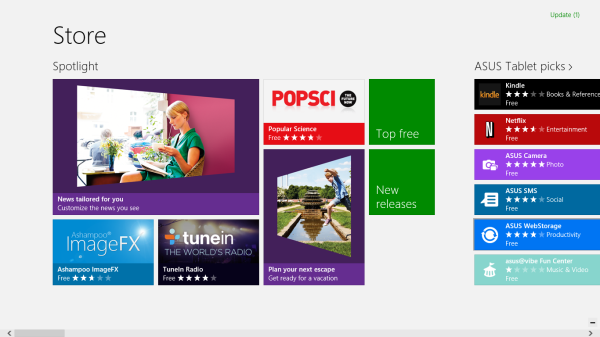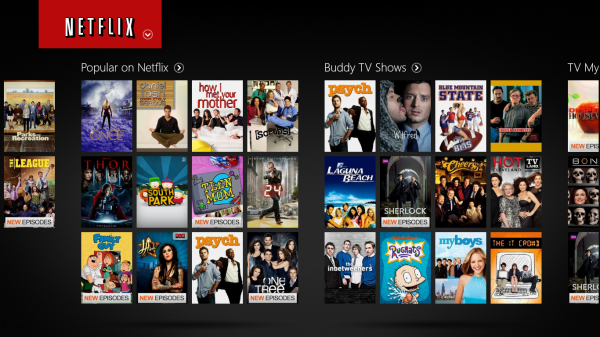The Windows RT Review
by Vivek Gowri & Anand Lal Shimpi on October 25, 2012 12:00 PM EST- Posted in
- Windows RT
- Operating Systems
- Microsoft
- Mobile
- Windows 8
- Tablets
Windows Store and the 3rd Party App Situation
So the third party app situation, out of the gate, is the biggest issue I can see with Windows RT. Obviously, with ARM processors, typical x86 legacy programs are out, so you’re forced to rely exclusively on the Windows Store for third-party applications. Within the Windows Store itself, almost all of the applications are compatible with both x86 and ARM architectures - Microsoft claims around 90% off the apps on the Windows Store at launch are compatible with both Windows 8 and Windows RT, and it appears that a lot of developers will be releasing applications on the Store for both platforms simultaneously.
The problem is that currently, there aren’t that many apps, and of them, not many are very good. Obviously, we’re still a couple of days from launch and I’m expecting a significant uptick in the number of quality apps on the 26th particularly, but also over the coming weeks and months. As the new versions of Windows gain market share, the Store will grow and mature.
Let’s talk about the Store itself. It’s a bit of a mixed bag. Yes, the Metro visual style looks great here, as it does almost everywhere else. Metro just lends itself well to anything involving lots of rectangular pictures (or app icons, in this case). Unfortunately, the Store is a bit poorly organized, and it’s difficult to find really relevant applications. The “Top Free” list needs a “Top Paid” companion, and there absolutely needs to be a “Sort by most reviews” option. Those two things would make it significantly easier to find the high-volume, headlining applications in any given category. I also really, really want the option to see all applications made by a specific developer (like, say, Microsoft.) The inability to do so is a pretty significant oversight from where I stand. These are all pretty simple fixes, just a few extra organizational options that would go a long way to making the store easier to navigate.
For right now, the best apps I can recommend on the Store are staples like Kindle, Netflix, Evernote, and Wikipedia, along with news and shopping apps from USA Today, NBC News, eBay, Newegg, and Popular Science. Other notable applications include IM+ and a number of internet radio apps like iHeartRadio, TuneIn Radio, and Slacker. In addition to those and a number of applications and games from Microsoft and Microsoft Studios - Xbox SmartGlass, Fresh Paint (a new paint application), OneNote MX (the Metro redesign of OneNote, still a preview), the Modern UI version of Remote Desktop, Reckless Racing, Hydro Thunder, etc - there’s not much out there, except maybe Fruit Ninja.
There’s still a lot of 3rd party stand-ins for applications that will get first party support, like a BBC News application actually developed by BBC and things like that. These independent apps can sometimes be good, but are almost always outdone by the first party ones. It’s just a matter of design and quality. I know that ESPN is slowly but surely bringing out their suite of applications - their cricket and football (soccer) apps were both released recently, which indicates that Scorecenter and their other applications for online radio and live video will all hit the store in the near future, but they’re just one developer. I just don’t know how much time it will take for a majority of those applications to be released. Skype isn’t currently available in the store, but will be on the 26th, which makes me wonder how many new applications will hit Windows Store in time to coincide with the official launch date of Windows 8. I want to revisit this a week from now, or even just two days from now, to see where things stand.
I’ve seen a lot of early reviews of Windows RT-based tablets decry the app situation, but I’m assuming the growth will occur significantly more quickly than it has for, say, Windows Phone, for one simple reason: this is still Windows. A very different kind of Windows, yes, but it’s not like people will stop buying Windows computers. Windows Phone has had issues gaining marketshare over the last two years, but starting tomorrow, 85% (or more) of computers being sold worldwide will be running either Windows 8 or Windows RT. There are too many people out there with new Windows systems for developers to somehow just stop releasing Windows applications.
It's important to remember that devs aren’t creating apps for Windows RT specifically, they’re creating new applications for the new Windows UI, which just happens to cover two very different hardware platforms. Nobody worries about the state of Windows 8 applications because all of the legacy desktop apps will still work, but the Windows Store will develop and mature at the same pace regardless of whether you’re looking at Windows 8 or Windows RT. Everyone worrying about Windows RT tablets and third party apps should have the same concerns about touch-centric apps for Windows 8 tablets.
But regardless, we’re still missing some huge applications at this point: Facebook, Twitter (though Rowi makes for a good stand-in), Dropbox, Pandora, Yelp, any kind of Google service, anything from Adobe, and generally useful but not necessarily headlining financial and bank-specific apps. Check back with us in a few days, because I don’t think the Windows Store will stay as sparsely populated as it is currently, but until that changes, there will be questions.












233 Comments
View All Comments
Taft12 - Thursday, October 25, 2012 - link
You seem to have missed the way the app store phenomenon has depressed software prices. You may take quantity over quality but hardly anyone else does.SlyNine - Friday, October 26, 2012 - link
At least in your opinion. I'm with A5cent. Your point remains to be proven, right now its just your opinion.steven75 - Friday, November 2, 2012 - link
Apple's own AAA apps such as iPhoto, iMovie, Garageband, iWork are almost all $5.And they are FAR more capable than anything you can get on Metro right now.
MadMan007 - Thursday, October 25, 2012 - link
"This stage of the Tablet market"...I'm not sure what you could possibly mean there. This is the very early stage of tablet development. The iPad was released about 2 and a half years ago, that's nothing and I don't understand why people try to declare a market won when it's that new and still growing very fast.Dekker - Thursday, October 25, 2012 - link
What I mean is that developers will first write for iPad because it has an installed base of 100 million devices. Only much later will they write for less popular platforms. Some apps may not make it to RT at all. Overcoming the disadvantage of being the less attractive platform is very hard because of the self-reenforcing effects (ask Apple about their experience in the 90s when software support for the Mac faded).Not all is lost for MS, but they do not have much room for error or delay in the tablet space. As for Apple, the technology industry only grants temporary near-monopolies and they will not be on top forever.
MadMan007 - Thursday, October 25, 2012 - link
I guess if Apple continues their douchery of limiting which development tools developers can use then yeah. (Maybe they stoped that? It was in relation to Adboe tools iirc, not Flash.)Otherwise cross-platform developing will become the norm, with some necessary differences due to UI or what have you, and other tweaks as devs see fit. MS may provide some great dev tools to make this happen, even if it's just to port over to WinRT, and there are already dev tools to create apps for both WinRT and Win x86.
That last bit is where a lot of WinRT apps will come from. Devs making apps for what will be the huge Win x86 install base and just porting them to WinRT.
khanikun - Friday, October 26, 2012 - link
The difference so far is the iPad is a toy tablet. Windows RT is not. The benefit of a merger of toy tablet OS combined with a desktop OS.strangis - Friday, October 26, 2012 - link
Developers can target ALL Windows 8 computers with RT apps, which means the market will potentially be 300+ million people within a year.That far surpasses the iPad in exposure.
steven75 - Friday, November 2, 2012 - link
Except Metro is being widely panned for keyboard/mouse use.dysonlu - Friday, October 26, 2012 - link
I think the crucial points for a platform, and this may sound a bit controversial, are "hackability" and games. That's what jumpstarts a platform. Hackability: an underground scene for free apps and games or for other "illegal" use of the platform/device will lower the barrier of entry and thus increase adoption rate. The amount of people wanting free and illegal stuff can't be underestimated. Games, of course, more than any apps are what people download and buy compulsively. Games are compelling to everyone, from 7 years old to 77 years old users. Games are what people tell their friends about, they promote visibility and popularity of the platform.